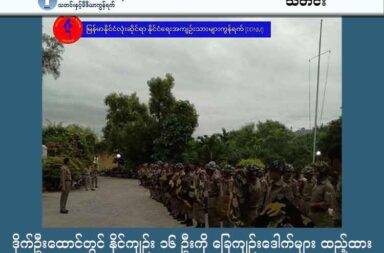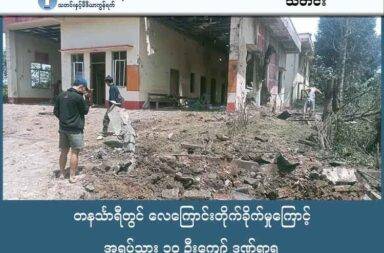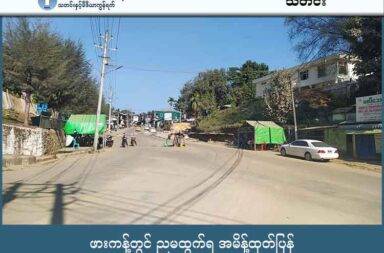Two Years After Armed Conflict in Mong Ko, Locals Still Struggle to Survive
Fighting in 2016 drove farmers into the town, where they remain trapped in a cycle of daily labor and rent costs.
By NETWORK MEDIA GROUP (NMG)
Tuesday, November 27, 2018
Locals in Mong Ko on the Burma-China border say they are still facing difficulties pursuing their livelihoods since clashes occurred between government forces and ethnic armed groups two years ago.
The Burma Army and armed organizations belonging to the ethnic coalition known as the Northern Alliance engaged in particularly heavy fighting in the area in late 2016. Northern Alliance troops took control of Mong Ko but failed to seize the Tatmadaw’s strategic hill camp, and in the end retreated.
Thousands of villagers fled to China during the battles and many moved to the nearby Mong Ko town. Today, they remain unable to return to their land, citing a continued lack of security in the area.
Since 2016, people “live with fear,” said local Ko Min Min, who explained that this has caused many villagers to abandon their farms and seek daily wage labor in construction or on sugar cane and corn plantations across the border in China.
“People were not so poor before the battles began,” another local, Jiang Jin Lin, told NMG. “People didn’t need to go work in other places. In the past, some youth went to work in China. Now married men go to work in China. They have left their children at home.”
In China, men from Burma can earn 50-60 yuan (US$7.20-$8.60) per day, but also risk being exploited and unpaid, explained pastor Brang Nan, who works in Mang Kang village.
“Some people don’t have money in hand when they come back home. Some people run away from their work sites if they don’t have a passport or ID card. There are many stories like this,” he said.
Still, many people who once lived in the mountains around Mong Ko now opt to live in the town where they feel safer, but where any income they earn goes toward rent, and it remains difficult to save or plan for the future.
“The money they earn goes toward renting a house. That’s why they have problems. It’s a hardship. They don’t have their animals. They can’t do business in breeding animals. That is why they have faced economic hardships,” Brang Nan said.
The Northern Military Alliance consists of the Arakan Army, the Kachin Independence Army, the Ta’ang National Liberation Army, and the Kokang or Myanmar National Democratic Alliance Army.


